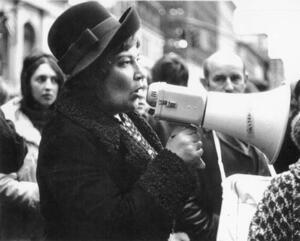Women strike for peace
On November 1, 1961, Women Strike For Peace (WSP) was inaugurated with a day-long strike by an estimated 50,000 women in 60 cities, all pressing for nuclear disarmament. The organization was composed primarily of mothers who feared the effects of nuclear proliferation on the short- and long-term health of their children. They were particularly concerned with levels of irradiation in milk and the increase in nuclear testing. WSP had the slogan “End the Arms Race – Not the Human Race,” as well as “Pure Milk, Not Poison.”
Bella Abzug joined the group in its early organizational stages as an active participant in the New York contingent and as creator and chairperson of WSP’s legislative committee. By pushing the organization to incorporate legislative lobbying into its efforts, she helped it to become an effective political force. By 1964, the emphasis of Women Strike for Peace had shifted to focus as much on the Vietnam War as on disarmament, protesting against the draft and the war’s effects on Vietnamese children. Abzug remained active in WSP until she was elected to Congress in 1970.
Sources: Women Strike for Peace: Traditional Motherhood and Radical Politics in the 1960s (Chicago, 1993); http://www.san.beck.org/GPJ28-WomenforPeace.html.




We are a non-profit Women's organization based in Eastern region of the Democratic Republic of Congo.
Our main objective is to fight and protect women's rights in these eastern provinces of our country more affected from violences and discrimation of women.
So we would like to partner with your organization.
Thank you
The WSP was born on 1 November 1961 when thousands of mainly white, middle class women staged a one-day national peace protest. An estimated fifty thousand women in over sixty communities came out of their kitchens and off their jobs to demand that President Kennedy Ì¢âÂÒEnd the Arms Race Not the Human RaceÌ¢âÂå. These women were moved to drastic action by the Soviet resumption of atmospheric nuclear tests, after a three-year moratorium and by the United StatesÌ¢âÂ㢠declaration that it would hold its own tests in retaliation . The group consisted mainly of married-with-children middle-class white women. Its early tacticsÌ¢âÂÛincluding marches and street demonstrations of a sort very uncommon in the U.S. at that timeÌ¢âÂÛin many ways prefigured those of the anti-Vietnam War movement and of Second-wave feminism. The roots of the organization lay in the traditional female culture- the role women played as full time wives and mothers and its rhetoric in those years drew heavily on traditional images of motherhood. In particular, in protesting atmospheric nuclear testing, they emphasized that Strontium-90 from nuclear fallout was being found in mother's milk and commercially sold cow's milk, presenting their opposition to testing as a motherhood issue,[4] what Katha Pollitt has called "a maternity-based logic for organizing against nuclear testing."[6] Engagement rings as middle-class mothers, they were less vulnerable to the redbaiting that had held in check much radical activity in the United States since the McCarthy Era.[4] The image projected by WSP of respectable middle-class, middle-aged ladies wearing white gloves and flowered hats, picketing the White House and protesting to the Kremlin to save their children and the planet, helped to legitimize a radical critique of the Cold War and U.S militarism .
were all there, all the generations marching together.